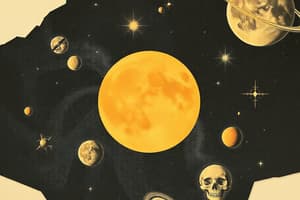Podcast
Questions and Answers
What is the solar system?
What is the solar system?
The solar system is made up of the Sun and the planets and other objects that orbit around it.
Which of the following is not a planet in our solar system?
Which of the following is not a planet in our solar system?
- Pluto (correct)
- Earth
- Saturn
- Mars
What is a telescope?
What is a telescope?
A telescope is a tool that gathers light to make faraway objects appear larger, closer, and clearer.
Who stated that the Sun, not Earth, was at the center of the solar system?
Who stated that the Sun, not Earth, was at the center of the solar system?
What is a galaxy?
What is a galaxy?
What is matter?
What is matter?
A solid is matter that has a definite shape and _____.
A solid is matter that has a definite shape and _____.
A liquid takes the shape of its _____.
A liquid takes the shape of its _____.
What are elements?
What are elements?
What is an atom?
What is an atom?
What did Glenn Seaborg create?
What did Glenn Seaborg create?
Flashcards are hidden until you start studying
Study Notes
Solar System
- Composed of the Sun, eight planets, and various celestial objects.
- Inner planets: Mercury, Venus, Earth, Mars.
- Outer planets: Jupiter, Saturn, Uranus, Neptune.
Definition of a Planet
- A large sphere in space orbiting a star.
- Planet characteristics: rotation on axis and revolution around the Sun.
- Size varies; some are smaller than Earth, while others are larger.
Celestial Objects
- Stars: Hot, glowing gas balls; the Sun is a medium-sized star.
- Asteroids: Rock or metal fragments.
- Comets: Composed primarily of ice, along with dust and rock.
- Meteors: Small debris from comets or asteroids.
Telescopes
- Instruments that gather light to magnify distant objects.
- Types:
- Hubble Space Telescope: Orbits Earth, captures images regularly.
- Radio telescopes: Detect radio waves, converting them into images using computers.
Historical Discoveries
- Copernicus (1543) proposed that the Sun is the solar system's center.
- Galileo used telescopes in 1609 to provide evidence of Earth's orbit around the Sun.
Constellations and Galaxies
- Constellations: Groups of stars forming identifiable patterns; names derive from imagined shapes.
- Galaxy: A vast collection of stars; the solar system resides in the Milky Way galaxy.
States of Matter
- Matter: Substance that occupies space and has mass.
- States:
- Solid: Defined shape and volume (e.g., book, cup).
- Liquid: Defined volume but variable shape; conforms to its container (e.g., water, juice).
- Gas: No defined shape or volume; expands to fill its container (e.g., helium in a balloon).
Matter Vocabulary
- Mass: Amount of matter in an object.
- Volume: Space an object occupies.
- Phase changes:
- Melting: Solid to liquid with heat.
- Evaporating: Liquid to gas with heat.
- Freezing: Liquid to solid with heat loss.
- Condensing: Gas to liquid with heat loss.
Elements and the Periodic Table
- Elements: Fundamental components of matter; over 100 recognized.
- Periodic table: Chart organizing known elements by their symbols.
Glenn Seaborg and Plutonium
- Created plutonium (atomic number 94) in 1940, important for nuclear weapons and energy.
- Identified several heavy elements and their isotopes, contributing significantly to chemistry.
Atoms
- Atoms: Smallest units of elements; identical within the same element.
- Invisible to the naked eye; smaller than dust particles.
- Studied using electron microscopes, which can examine these minute structures effectively.
Studying That Suits You
Use AI to generate personalized quizzes and flashcards to suit your learning preferences.




